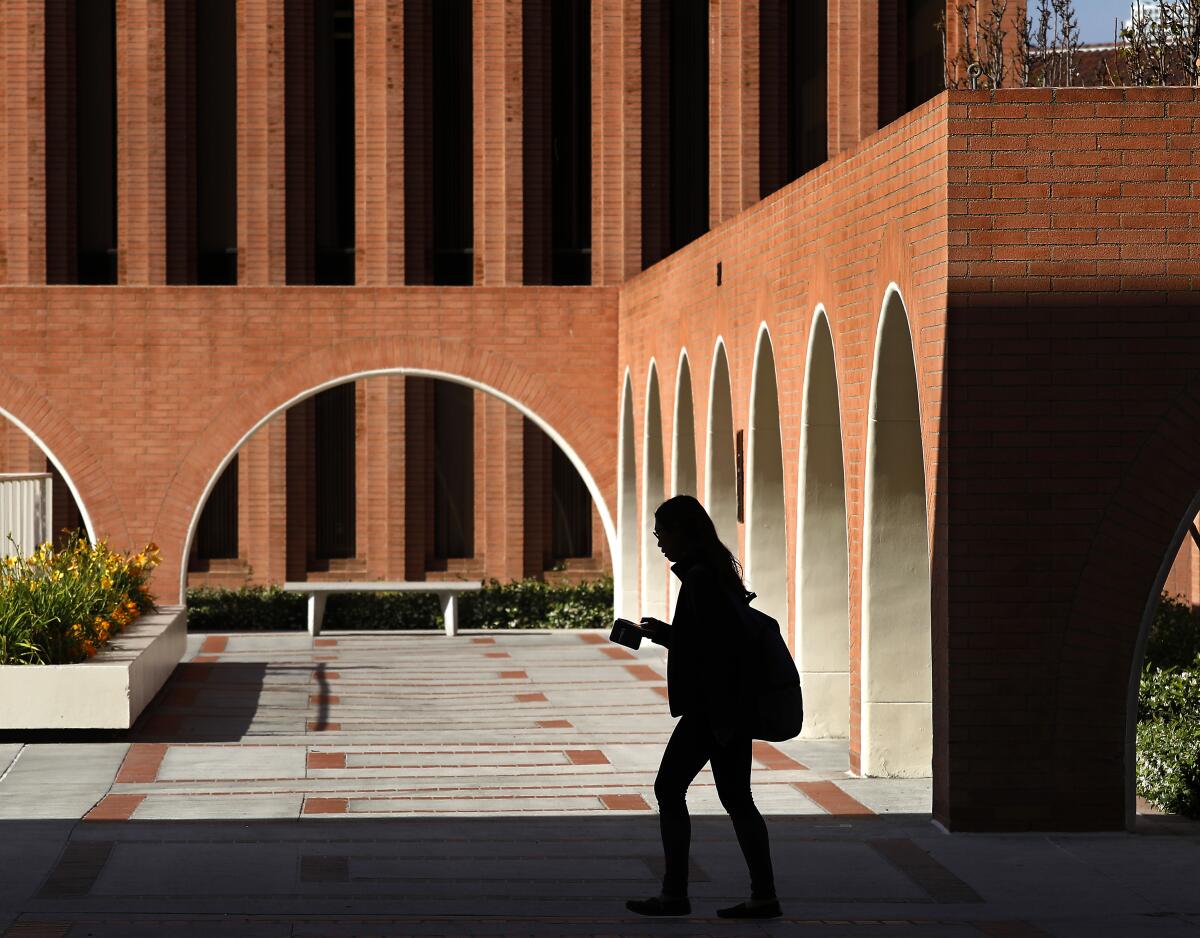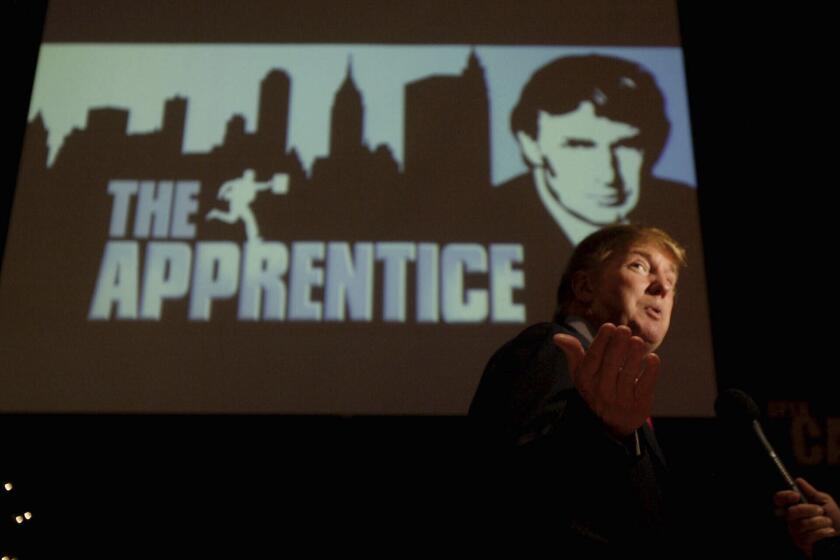Opinion: Why everyone in L.A. should care about USC’s scandals

Good morning. I’m Paul Thornton, and it is Saturday, Nov. 13, 2021. My three kids got their first COVID-19 shots this week, because children ages 5-11 were finally authorized to receive the Pfizer-BioNTech vaccine. Let’s take a look back at the week in Opinion.
Before reading any further, know that I have a brother, an aunt and an uncle who graduated from UCLA; have a nephew who will soon graduate from UCLA; and as a UC Berkeley undergraduate would shake the keys for my work and apartment (I didn’t have enough money for a car) at the USC student section while the Trojan Marching Band played on the field during football games, a taunt those of us in public universities like UCLA and UC Berkeley reserved for private schools like USC and Stanford. So consider yourself informed of my personal bias — or just the chip on my shoulder.
But you don’t have to be a creature of college rivalries to worry over the never-ending scandals at USC. This is a university that throws its weight around in Los Angeles — it effectively helps operate the largest public hospital in the county, is one of the largest private employers in the area, and its influence extends to the region’s most important institutions. When Rep. Karen Bass announced she was running for mayor of Los Angeles, the university’s journalism school posted a report heralding an alumni’s candidacy; she may be joined in that race by Rick Caruso, the billionaire developer and chairman of USC’s Board of Trustees.
So it might concern more than just USC football fans and alumni that the university’s School of Social Work entered into a business partnership with a private company that made it operate more like an expensive for-profit diploma mill than an academic institution. As The Times Editorial Board noted, the partnership created an online social work master’s program than left graduates deeply in debt while working in jobs that paid far less than they needed. The financial pressure caused by the revenue-sharing arrangement may have also contributed to yet another scandal — the federal indictment of Los Angeles City Councilman Mark Ridley-Thomas and the school’s former dean.
More disturbing is USC’s handling of allegations of sexual assault and druggings at the Sigma Nu fraternity. Columnist Jean Guerrero, an alumnus, chillingly mentions that she is not at all surprised by allegations, nor is anyone who recalls the “parties on Greek row [that have] long been incubators of rape and other violence.” She says all Greek life at USC should be banned: “USC has suspended Sigma Nu and is enforcing a pause to fraternity parties, but it’s not about a few bad apples. It’s about organizations structured to dehumanize and endanger women at university-sanctioned events.”
Mind you, this is an institution that has dramatically expanded its reach into Los Angeles and improved its reputation since the 1990s. If USC chooses not to make serious reforms, everyone in the region could be worse off.
This isn’t to say the UC system is currently skating by. At UC Santa Barbara, they want to build a prison-like dorm to house 4,500 students, a testament to the university system’s overcrowding crisis, says the editorial board: “The bottom line: The UC system is over-enrolled and at a tipping point, in danger of no longer being the internationally admired gem of public higher education.” For UC lecturers, the situation is especially dire: About one-quarter of them leave after teaching for a year, and the median salary is $25,000 — part-time pay for full-time work, writes former UC Irvine lecturer Diane Mendoza Nevárez.
You heard right. Aaron Rodgers played the Martin Luther King Jr. card. Columnist LZ Granderson writes: “The rub is the Green Bay Packers quarterback presented his King paraphrase as if he was on the front lines challenging an unjust law, when in reality he was just sitting on the couch trying to find ways to avoid being held accountable for his words. ... Now I’m not suggesting Rodgers, or anyone else for that matter, can’t quote King. But contexts matter.” L.A. Times
If you’re poor, nonwhite and live in California, you have a good chance of residing in an area that’s unsafe for cycling. Ostensibly, California encourages a form of transportation that emits essentially zero greenhouse gases and promotes health, but infrastructure upgrades that make cycling safer are moving slowly, perpetuating inequities in low-income areas where police are more likely to use bike infractions as a pretext for a stop. Plus, if you bike in an area patrolled by the Los Angeles County Sheriff’s Department, you’re much more likely to be stopped and searched if you’re Latino, according to a Times investigation. The editorial board says this is yet more proof that the sheriff needs greater oversight.
Enjoying this newsletter? Consider subscribing to the Los Angeles Times
Your support helps us deliver the news that matters most. Become a subscriber.
Can the Republican Party win without Trump? Maybe, says columnist Jonah Goldberg: “One of the lessons of last week’s elections is that Republicans can win back suburban and independent voters by talking about real issues, exploiting Biden’s weaknesses, and highlighting the Democrats’ excesses. If Trump is in the race, he has made it clear what he’ll talk about. ‘If we don’t solve the Presidential Election Fraud of 2020,’ Trump said last month, ‘Republicans will not be voting in ’22 or ’24. It’s the single most important thing for Republicans to do.’” L.A. Times
This is a spectacularly bad idea: A City Councilman wants to arm park rangers in Los Angeles. Yes, rangers have law enforcement training, but they’re different from big-city police officers: They conduct nature hikes, enforce park ordinances, participate in search-and-rescue missions (some L.A. parks are large and rugged) and occasionally answer public safety calls, for which they can ask the LAPD for backup. Allowing rangers to carry guns would run counter to the city’s effort to reimagine public safety, says the editorial board. L.A. Times
Stay in touch.
If you’ve made it this far, you’re the kind of reader who’d benefit from subscribing to our other newsletters and to the Times.
As always, you can share your feedback by emailing me at [email protected].
A cure for the common opinion
Get thought-provoking perspectives with our weekly newsletter.
You may occasionally receive promotional content from the Los Angeles Times.




